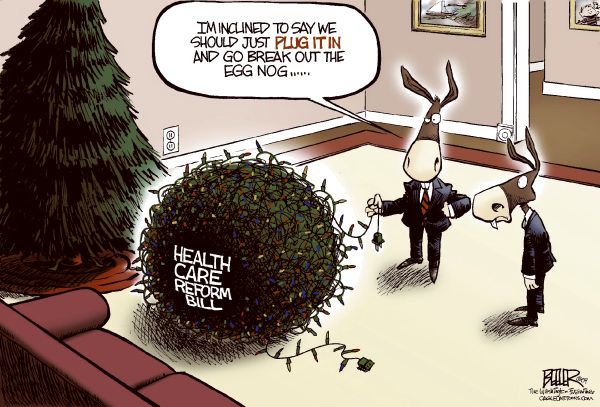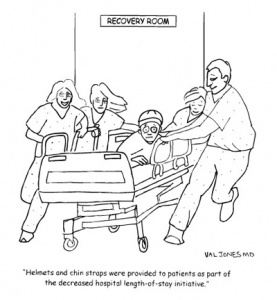Latest Posts
A Heartfelt Physician Apology
A recent oft-cited study showed that doctors who who apologized for mistakes were less likely to be sued. My initial reaction to that is to file it under “duh.”
But then I was greeted with a note lying on my desk.
Dr. Rob:
First, I want to tell you that for the majority of the many years my family has been patients of your practice, I believe we received excellent care and you always had our best interests in mind. Further, we appreciate all that you and your staff have done for us.
However, it is with great regret that I find myself in the position of writing to you with a problem I see as pervasive in your practice…
Ugh. This is not the way to start my day.
The letter went on to describe a problem with communication of a concern the patient had about a medical problem that was very worrisome to her. It didn’t point the finger of blame at my nurse, nor any one else in the office. It wasn’t at all angry in its tone to me. It simply expressed the disappointment of a patient who felt let-down by her physician.
The letter ended with:
I look forward to speaking with you about this issue early in the week of July 20.
Thank you in advance for your attention to this matter.
I put off calling her until the end of the day. I knew she would be reasonable overall, but beyond the fact that I hate calling people on the phone at all, I hate calling when I know I have to apologize. The problem in this case was not with my staff or with confusion in the office. The problem was with a physician who simply dropped the ball and did not follow-up as promised.
I finally called:
Hi.
First let me say thank you for the letter you sent. I mean that sincerely. I would much rather hear about problems in our office than to simply having people get angry and leave. This is something I needed to hear.
Second, let me say that the blame is 100% mine. I really wasn’t worried about the problem and so I honestly just let it slip my mind. I did tell you I’d contact you and would send you to a specialist if things weren’t clear after the tests I ordered. I’m sorry about that.
I went on to discuss the situation and that I didn’t think anything was serious at all. She still wanted to go ahead with the consultant because of some stuff she had heard about the condition. I told her that I have no problem with that, as I see my job as one of giving my advice and perspective; but not as making the final decisions. The most important thing is that her worries are addressed and that she feels comfortable that everything is OK. If it takes a consultant to do that, then I have absolutely no problem with that.
I also explained that communication in a medical office is very difficult – and has gotten much harder as we have gotten busier. It is our plan to eventually have communication by e-mail, but that is not ready for prime-time. This is not an excuse, I told her, but an explanation and a promise that I do see the problem and we are doing something about it.
As expected, she was gracious about the situation and was thankful for the apology. I didn’t do it to avoid lawsuit or to protect myself. I like this family and didn’t want to lose them as patients. Beyond that, though, I owed her an apology. I had let her down. I hadn’t done what I promised I would do. She had been kind enough to send me the letter and deserved a quick resolution to the situation.
I still hated picking up the phone, though. It isn’t easy to admit fault, no matter how accepting you know the other person will be.
As obvious as it seems that apologizing will prevent lawsuit, it is a hard thing to do.
But I am glad I did.
*This blog post was originally published at Musings of a Distractible Mind*
Rushing Healthcare Legislation Through Without Consensus
I belong to a terrific organization that brings together C-level executives, once a month, to discuss issues each of us face. It’s called Vistage. One of the subjects we talked about yesterday was health care. It was like a focus group made up of seasoned, senior executives from many different industries.
The discussion revealed the tremendous divide between what ordinary Americans think about health care and what policy makers in Washington are doing. It’s a combination that is almost certain to ensure that whatever reform passes may make our problems worse, rather than better.
At the meeting were about 30 executives, representing everything from financial services, commercial real estate, manufacturing, high technology, pharmaceuticals, insurance, retail, non-profits, travel and others. Although all thought health care costs were in a state of crisis in America, I did not hear anyone say this was the case in their business. To be sure, some complained that health costs were high, and that there were few alternatives available. But others described changes they had made to their plan designs that had actually reduced their corporate health expenses.
We talked about the proper role of government, the comparative worth of systems in other countries, the responsibility of people to take care of their own health, end-of-life care, over-treatment, the uninsured, access to care, comparative effectiveness, and our own expectations of what the system should do for all of us. There was no consensus among this group of 30 business leaders as to these subjects and what we should do about them, other than that they are important topics that we need to address. I suspect this is true outside of this group, too. Indeed, the huge collection of issues that fall under the category of health care reform is something I’ve pointed out before.
But the President and leaders in Congress want debate on health care to end. They want a a bill to pass in the next couple of weeks.
Most of the group members were surprised to hear that Congress had already drafted legislation and was getting ready to vote on it.
It’s a remarkable thing. We are in the midst of trying to redesign the largest health care system in the world, and we’re barely debating the merits of it. How many members of Congress will have read the 1,1018-page bill once they vote on it? How many Americans will understand what implications it has for their health care if it — or something like it — becomes law?
The President often says that the status quo in health care is “not an option.” The trouble is, the status quo in health care is a rapidly changing thing. Today, every day, employers and doctors and so many others are busy making real, meaningful changes to our health care system. Not by waiting for committees of Congress to pass legislation, but by getting together and doing things that improve the quality and cost of care and the lives of patients. We need to be listening to their stories, and learning from them. Congress hasn’t done this, and can’t now.
There is an opportunity to build a real consensus around the important issues we talked about yesterday. We can transform our health care system in ways that make all of us proud. But it can only happen by working through these hard questions, not by hurrying to pass a bill before the August recess. Those who say we have a once in a generation chance to reform health care today may be right, but not for the reasons they think. By passing bills without consensus on this deeply important and emotional issue, they are ensuring that no one will really want to try to reform health care again for a very long time.
Which leaves us very much where we started. I will continue to do my part to share the important stories of how real people are making real reform. The political attention to reform may end sometime this year, but the reality of people trying to figure out what to do when sick will continue.
*This blog post was originally published at See First Blog*














